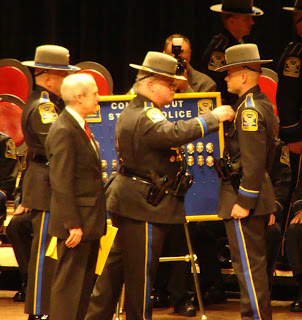I'm a sucker for a good extended metaphor, so I enjoyed this chapter in which teaching was compared to playing jazz. It is so accurate, especially for older experienced teachers. So much of what I do is second nature that I hardly have to think about it. I found this to be very true when I was planning for being out for two weeks after my surgery. "How hard could it be," asked my kids, when I mentioned my struggles. "OK," I said, "imagine that I told you to get up go to your car and drive home right now. You could do it almost automatically, right? Now imagine that you have to give a total stranger directions for doing the same thing. You have to walk them through every step: how to get out of the building, how to find your car in the parking lot, how to turn it on, and explicit direction on how to get to your house. Not so easy, is it?"
This is what teaching is like, second nature. We get relaxed, comfortable. Complacent, perhaps. We don't like change because change asks us to do more, to do things differently, to try, to stretch, to grow. And growing is sometimes painful. So we build barriers and say we have no time! We have no resources! We don't know how! And I get frustrated with people like that. If teaching is about learning, shouldn't we model a willingness to learn and try new things? What would any one of us do if our students used any of the excuses that we try to use? Would we buy it? Probably not. But it works for teachers sometimes.
I liked that part of this chapter that mentioned that "adults need to know why they should learn something, and how, if at all, it will benefit them directly" (p.267). Perhaps it is different for me because I teach high school, but I know that my kids feel this way. They really want to know why they are learning things and how it will benefit them. Incorporating 21rst century skills into the curriculum will not only excite them, it will provide an answer to those questions of "Why do we have to do this?" and "Why do we have to read this" or the more dreaded "Do I need to know this?" and "Will this be on the test?"
I also liked the part of the chapter that talked about "developing a taxonomy of TPCK-related activity types" (p. 263). This may be what some teachers need in order to start exploring TPCK. It's always easier when you have a template or framework given to you, rather than having to re-invent the wheel. We should go back to our schools and implement our projects next year. Then we should present them to the entire staff at our respective buildings. We may be able to inspire some of our colleagues to try "just one thing" related to technology. We need to take away the barriers that are currently used as excuses and challenge everyone to grow.
 Dave and I have no children. That was a choice and we do not regret it. However, I have about 75 to 100 "kids" a year. Many of them are trying at times, but I love working with them. Some of them, though, become very special to me.
Dave and I have no children. That was a choice and we do not regret it. However, I have about 75 to 100 "kids" a year. Many of them are trying at times, but I love working with them. Some of them, though, become very special to me. 
